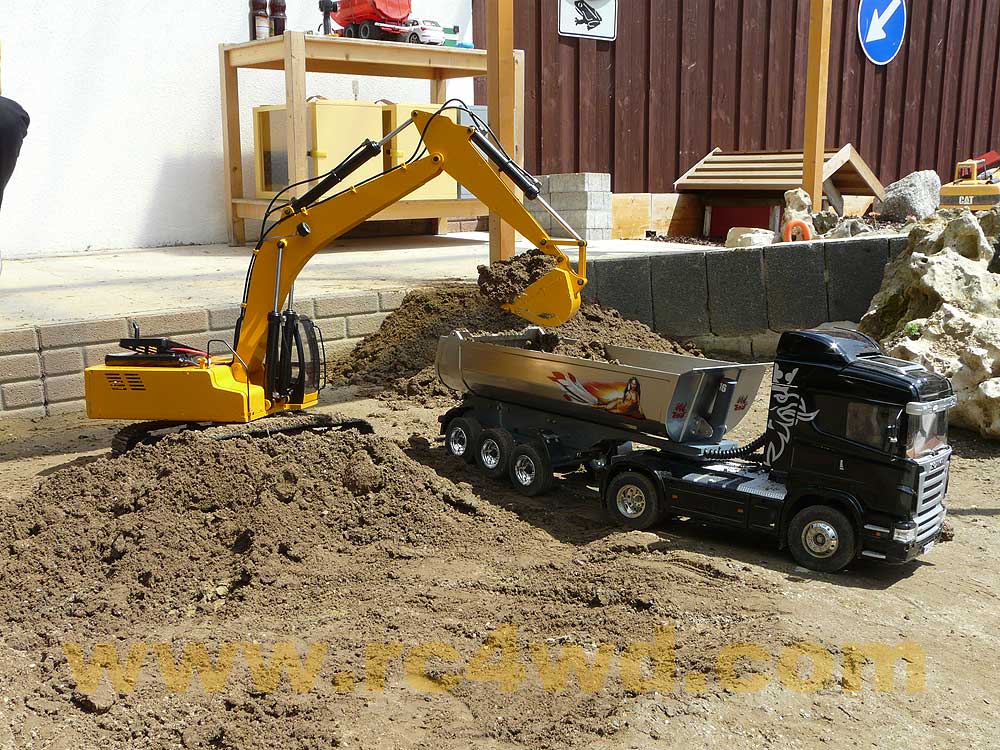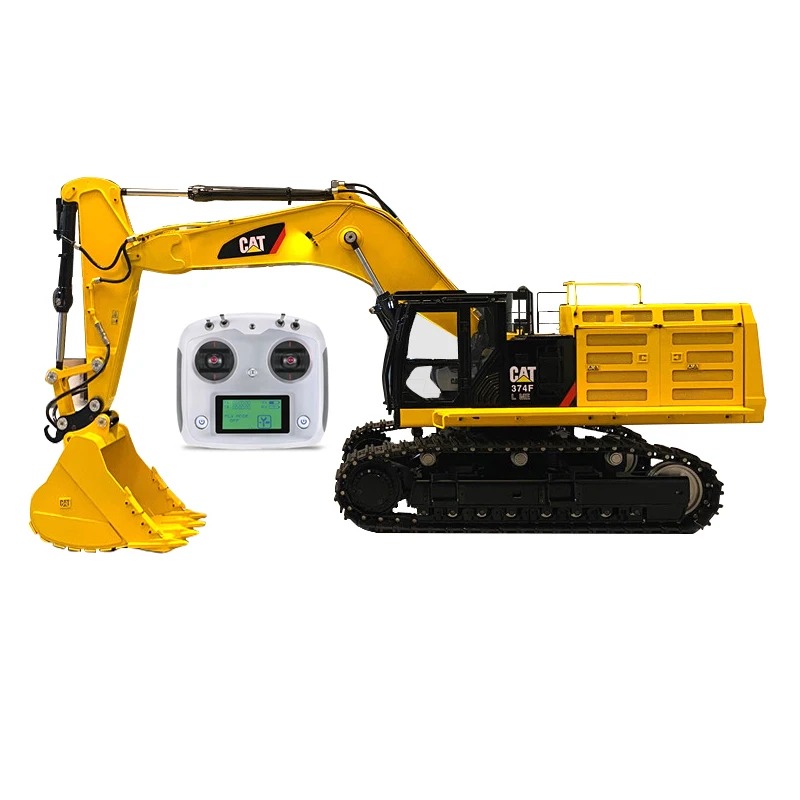Recognizing Just How Excavator Works and Its Effect On Effectiveness
Excavators play a necessary duty in building and mining procedures, relying upon an intricate interplay of mechanical and hydraulic systems. Their ability to do a range of tasks depends upon both their layout and the technology integrated within. Understanding these components can significantly influence functional effectiveness and performance. As improvements remain to reshape the market, one have to consider just how these adjustments will certainly affect future practices and efficiency.
The Fundamentals of Excavator Mechanics

The Function of Hydraulic Systems in Excavators
At the heart of excavator operation lies the hydraulic system, which plays a critical function in powering the equipment's features and movements. This system uses pressurized hydraulic fluid to move power, making it possible for different activities such as lifting, excavating, and moving. By utilizing the concepts of hydraulics, excavators can do tasks with amazing precision and force, improving total operational efficiency.The hydraulic system contains crucial components, consisting of pumps, cyndrical tubes, and valves, which interact to control the circulation and instructions of the fluid. When the driver involves the controls, the hydraulic fluid is guided to specific cyndrical tubes, converting the driver's commands into physical motion. This device permits for receptive and smooth actions, which are essential in building and excavation atmospheres. double e volvo rc excavator. The efficiency of the hydraulic system straight affects the efficiency and flexibility of the excavator, making it an indispensable component in modern-day excavation procedures
Trick Elements of an Excavator
Understanding the crucial parts of an excavator is important for realizing just how this effective maker runs. An excavator includes a number of substantial components, including the undercarriage, house, container, boom, and arm. The undercarriage offers stability and mobility, often featuring tracks or wheels to navigate various terrains. Your home consists of the engine and hydraulic systems, enabling the driver to manage movement and power the equipment. The boom prolongs from the house, enabling vertical reach, while the arm attaches to the pail, facilitating excavating and lifting operations.Additionally, the taxicab houses the operator, geared up with controls for accurate maneuvering. Each of these components plays an important function in the excavator's total functionality, adding to its efficiency and efficiency on building and construction sites. Recognizing these components aids in enhancing and maintaining excavator efficiency, ensuring tasks are finished securely and properly.
Attachment Adaptability and Its Advantages
Attachment adaptability is an important element of excavators, enabling operators to switch over in between various tools customized for details jobs. This versatility not only enhances job effectiveness however additionally adds to cost-effectiveness by reducing the demand for multiple equipments. Comprehending the various sorts of attachments offered can significantly influence the general performance and capability of an excavator on job websites.
Kinds of Add-ons
While excavators are largely identified for their excavating capabilities, their true flexibility hinges on the large selection of accessories readily available. These add-ons enhance the excavator's capability, enabling it to do different tasks past excavation. Usual add-ons include pails (for digging and scooping), hydraulic thumbs (for comprehending products), and augers (for drilling openings) Grapples are utilized for handling and moving debris, while rippers can separate difficult surfaces. Other specialized accessories, such as plates and plows, enable excavators to adjust to particular task demands. This variety not only raises the machine's energy throughout different industries, consisting of landscape design, construction, and demolition, yet additionally allows drivers to tailor their equipment to meet details task needs efficiently.
Enhanced Task Effectiveness
Making the most of work effectiveness is a primary advantage of utilizing numerous excavator accessories. Various attachments allow an excavator to carry out multiple tasks without needing to change tools, conserving valuable time and labor. As an example, utilizing a hydraulic hammer can damage concrete while a pail accessory can excavate soil, enabling a smooth operations. This flexibility reduces downtime associated with tools changes and improves efficiency on-site. Furthermore, specialized add-ons improve precision in jobs such as grading or landscaping, causing higher high quality outcomes. The capacity to adjust to different job needs not only streamlines operations yet additionally lessens the need for added equipment, making sure that tasks are completed quickly and efficiently. In general, add-on adaptability considerably adds to increased task effectiveness in excavation work.
Cost-Effectiveness and Versatility
Cost-effectiveness is a considerable advantage of making use of functional excavator attachments. These add-ons enable a solitary excavator to do several tasks, reducing the need for added equipment and labor - double e volvo rc excavator. By switching over in between buckets, hammers, and grapples, operators can deal with numerous tasks, from digging to demolition, consequently taking full advantage of tools utilization. This flexibility not just reduces functional prices however likewise decreases downtime related to altering tools. Furthermore, the capacity to customize excavators with specialized attachments enhances productivity, as they can effectively take care of varied jobs according to task demands. In conclusion, the mix of cost-effectiveness and versatility in excavator attachments adds to enhanced operational efficiency and resource allocation in building and excavation tasks

Advanced Innovation in Modern Excavators
Modern excavators are significantly furnished with advanced modern technology that transforms excavation procedures. Automation streamlines operations, while boosted gas effectiveness lowers functional prices. Additionally, wise control systems improve accuracy and safety, marking a substantial advancement in excavation devices.
Automation in Excavation Processes
As excavation innovation progresses, automation has actually arised as an important element in enhancing effectiveness and accuracy on job sites. Modern excavators are furnished with innovative automated systems that facilitate jobs such as grading, excavating, and trenching with very little driver intervention. These systems make use of sensors, GPS, and equipment understanding algorithms to assure exact placing and depth control, greatly decreasing the margin for mistake. Additionally, automation permits drivers to focus on calculated decision-making instead of manual controls, leading to boosted performance overall. Such advancements not just simplify operations yet also boost security by decreasing human mistake in complex procedures. The assimilation of automation in excavation procedures stands for a significant advancement in construction technology, driving the market in the direction of better performance and performance.
Boosted Gas Efficiency
Innovations in technology have actually also brought about significant enhancements in gas effectiveness for modern excavators. Modern makers are furnished with sophisticated engines that optimize power result while minimizing fuel her response usage. These engines use ingenious combustion modern technologies, such as turbocharging and straight gas injection, to boost performance and performance. Additionally, light-weight materials in building and construction minimize general weight, enabling much less energy expenditure during operation. The introduction of variable speed controls makes it possible for operators to readjust engine efficiency according to details tasks, additionally minimizing gas usage. As a result, these improvements not only reduced functional expenses however also add to ecological sustainability by decreasing emissions. On the whole, boosted fuel performance in excavators is a crucial development that bolsters performance and financial stability in the building sector.
Smart Control Solution
While drivers navigate progressively complicated task websites, wise control systems in excavators have actually arised as important devices for improving effectiveness and accuracy. These sophisticated technologies use algorithms and sensing units to keep track of various specifications such as load weight, terrain problems, and functional performance. By instantly adjusting hydraulic features, wise systems maximize device efficiency, resulting in boosted productivity and minimized endure elements. In addition, operators gain from instinctive interfaces that supply real-time feedback and diagnostics, permitting educated decision-making. This integration of innovation not only enhances procedures but also reduces human mistake, adding to safer workplace. As the building and construction industry proceeds to develop, wise control systems will certainly play an essential role fit the future of excavator effectiveness and performance.
Enhancing Operational Efficiency With Excavators
Excavators play a vital duty in boosting functional effectiveness throughout numerous building and construction and excavation projects. Their adaptability permits for multiple tasks, including digging, lifting, and material handling, which enhances process and lowers the demand for additional equipment. With powerful hydraulic systems, excavators can perform sturdy tasks with accuracy, considerably decreasing the time required to complete tasks. The combination of sophisticated innovation, such as GPS and automated controls, better optimizes their operation, enabling drivers to accomplish greater accuracy and minimize material waste. In addition, contemporary excavators are developed to consume less gas and minimize exhausts, adding to both price financial savings and ecological sustainability. By using excavators successfully, building teams can boost productivity, fulfill job due dates, and enhance total site management. This multifunctionality and effectiveness make excavators crucial devices in the contemporary building and construction landscape.
The Future of Excavators in Building And Construction and Mining Industries
As the construction and mining sectors develop, the future of excavators is poised for substantial transformation driven by technological advancement and changing operational needs. Breakthroughs in automation and fabricated intelligence are improving excavator capabilities, permitting boosted precision and performance in operations. Self-governing excavators are arising, minimizing the demand for human intervention and decreasing the threat of accidents.Moreover, the integration of telematics and IoT modern technology allows real-time surveillance of machine performance and anticipating upkeep, enhancing uptime. Eco-friendly designs, consisting of electrical and hybrid designs, are gaining traction, lining up with sustainability objectives within the industry.Additionally, using sophisticated products and lighter designs improves gas efficiency while keeping efficiency standards. As these patterns progression, excavators will certainly play a vital duty in satisfying the increasing demands for productivity and safety in building and mining, eventually changing functional landscapes.
Frequently Asked Concerns
Exactly How Do Weather Influence Excavator Efficiency?

Climate condition substantially affect excavator performance, as rainfall and mud can prevent traction and stability, while extreme temperature levels might impact hydraulic systems. Operators should adjust to these variables to assure ideal functionality and security during operations.
What Security Actions Should Operators Follow While Using Excavators?
Precaution for excavator operators consist of using proper personal protective equipment, conducting pre-operation assessments, making sure appropriate interaction with ground workers, maintaining a risk-free distance from above threats, and sticking to well-known functional methods to stop crashes.
Exactly How Usually Should Excavators Be Preserved for Ideal Performance?
Excavators need to be maintained regularly to ensure peak efficiency, generally every 250 operating hours or as specified by the producer. Regular checks enhance dependability, avoid unexpected malfunctions, and expand the lifespan of the tools.
What Is the Average Lifespan of an Excavator?
The typical life expectancy of an excavator typically ranges from 10,000 to 15,000 hours of procedure. Elements affecting long life include maintenance methods, operating problems, and the why not try here quality of the equipment itself, impacting overall efficiency and effectiveness.

Can Excavators Operate Uneven Terrain Successfully?
Excavators can run successfully on uneven terrain because of their expressed layouts and adjustable tracks. These features enable them to why not try this out keep security and grip, enabling effective procedure in tough environments commonly experienced in building and landscape design tasks. Each of these components plays an essential function in the excavator's general capability, adding to its effectiveness and performance on construction sites. Making best use of task performance is a main advantage of making use of different excavator attachments. While operators navigate increasingly intricate job sites, clever control systems in excavators have actually emerged as necessary tools for improving effectiveness and accuracy. Excavators play a crucial role in improving functional performance throughout different building and excavation jobs. Breakthroughs in automation and fabricated knowledge are reshaping excavator capabilities, permitting for boosted precision and performance in operations.